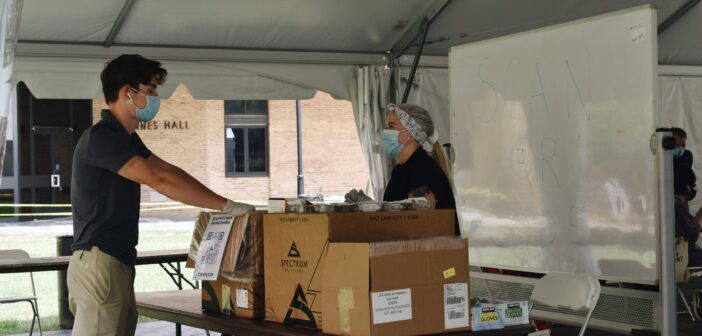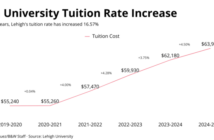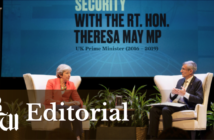The Brown and White put out a call on Twitter and Instagram to give readers a chance to send in questions they wanted the administration to answer regarding the university’s latest COVID-19 announcements. The following questions were sent to The Brown and White entirely from our readers, which were then forwarded to Lori Friedman, Lehigh’s media relations director, who provided responses. Editor’s note: These questions were compiled and sent to Friedman prior to both the university’s decision to extend entirely remote classes from Oct. 16 to Oct. 23 and prior to the decision to cancel spring break next semester.
As of publication, there are 155 positive COVID-19 cases among students in the Bethlehem area. That’s an increase from 65 positive cases reported on Oct. 5 and 100 positive cases reported on Oct. 7.
Q: Will work-study students still be receiving paychecks even if they are unable to work these next two weeks?
Lori Friedman: Any student who has an on-campus work study job is going to be able to submit their hours and get paid during this time.
Q: Will there be any staff furloughs as a result of the scaling back of activities?
LF: No.
Q: What plans are in place to punish those living off-campus hosting parties?
LF: All COVID-19 related violations — including unsanctioned gatherings of more than five people — will be addressed through an expedited COVID-19 related conduct process. Students may be interimly suspended for reported COVID-19 related violations, with potential for longer-term removal from campus, suspension, loss of campus access and expulsion, pending the outcome of an administrative hearing process.
Q: Does this decision have any impact on the spring semester?
LF: No. We continue to be guided by an approach that prioritizes the health and safety of the Lehigh and Bethlehem communities. Any decision regarding spring will be based on that approach. Registration for the spring semester opens for students in early November. Each course, both graduate and undergraduate, will have a clear description of the learning format that is most likely to take place.
Q: If the libraries are closed, how will students be able to access printers?
LF: Student Affairs is in the process of identifying other (non-residence hall) common area locations for printers as well.
Instructions for students to access printed documents will be very similar to the meal pick-up guidelines: urging students to go directly to the printer, retrieve documents and then return to their rooms. No congregating will be permitted.
Q: Are graduate students included in Lehigh’s testing policy?
LF: Yes. Graduate students who have been taking in-person classes or participating in in-person lab research are included.
Q: Will on-campus students receive any prorated discounts if they choose not to return to campus?
LF: If a student decides to leave, there is no refund for housing or tuition, except as stated in the refund policy: a tuition refund is issued on a prorated basis if the withdrawal is before 60 percent of the semester has been completed. Housing refunds are not allowed unless we are able to find someone else to fill the accommodation.
Q: When will we know if undergraduate researchers can return to on-campus research?
LF: Research may continue; however, research activities involving undergraduate students will require revised safety plans submitted to Environmental Health & Safety ([email protected]) and undergraduate students who participate in in-person research activities must be identified.
Q: For off-campus students, what if we decide to leave the Bethlehem area or have already left?
LF: Those who have left campus will need to follow specific health and testing protocols before returning in the future.
Q: For students in isolation or quarantine, how are you handling issues like the lack of private bathrooms or things like food delivery and checking in on symptomatic students?
LF: Students in isolation receive meals delivered to their door, cleaning supplies for their restroom and living space, bed linens and check-ins with a Health and Wellness Center health care provider.
-
Tissues, cleaning and sanitizing solution, hand soap, toilet paper, and paper towels will be available in isolation spaces.
-
Students assigned to isolation spaces should be cleaning the space regularly, twice per day, using cleaning supplies that have been provided.
-
Once an isolation room is vacated, the room will be fully cleaned using best-practice cleaning protocols related to COVID-19. This applies to all university-operated isolation spaces.
-
Health Center staff will be in regular contact with all students living in isolation spaces.
-
Students who test positive for COVID-19 may be isolated together (e.g. “cohorting” of positive cases) in separate bedrooms with a shared bathroom.
-
Students with symptoms who are suspected of having COVID-19 who are awaiting test results need to be isolated, but will not be isolated with students who have a known positive COVID-19 test.
For quarantined floors, ABM cleans, sanitizes, and removes trash from the bathrooms daily. ABM wears full PPE when cleaning quarantine bathrooms.
See updated information here as well: https://coronavirus.lehigh.
Q: How many COVID-related conduct cases have been initiated, and how many would you consider to be serious violations?
LF: Numerous interim suspensions have been implemented in the past few days. Given the increase in the number of positive cases, any failure to comply with the Social Contract is serious and jeopardizes the health and safety of the entire community.
Q: In response to Lehigh’s new guidance for quarantined students to pick up meals to-go from the dining halls: How is quarantine supposed to be enforced when students can now say, ‘Oh, I’m just going to the dining hall?’
LF: The change from delivery to takeout was made possible by our wholescale shift to a takeout process for all students. This process is designed to minimize contact with others and follows all appropriate health and safety protocols, including limiting the number of students gathering and incorporating socially distancing queuing as necessary.
Students place their takeout containers through a small opening on a tray, which dining staff then uses to place the food on; the server then puts the tray (never touching the takeout container) through the opening for the student to take. Both students and staff are wearing masks and staff are behind glass. Students are in and out of the dining halls within 10 to 15 minutes and stand socially distanced while in the dining hall.
These protocols will be enforced in a similar manner to all other protocols related to the health and safety of the community. Violations will be handled through an expedited Code of Conduct process.
Q: The Health Center has access to tests that give results in 24 hours, but they claim to be saving them for the people who are very sick. People off-campus who reported symptoms are being given a test that takes 24 to 48 hours to come back, while people who live on-campus and had “a headache” are being given the tests that come back in an hour. Why is Lehigh prioritizing those who live on-campus, despite the obvious fact that a majority of cases are off-campus?
LF: Lehigh currently utilizes four modes of testing:
1) Diagnostic testing for symptomatic students seen at the Health and Wellness Center, also called “point of care testing” or rapid testing. Specimen collection is done at the Health and Wellness Center for students presenting COVID-19 related symptoms. The test is processed at the Health and Wellness Center and has a one hour turn-around time. Due to limitations on the availability of test kits, we prioritize these tests for symptomatic students.
2) Specimen collection outside the entrance of the Health and Wellness Center at the Health and Wellness Center tent. This is for asymptomatic close contacts of positive cases. These specimens are sent by courier to HNL Lab Medicine for processing. Turn around time has been 24 hours for the most part, though at times may be longer. This allows for a larger volume of students to be tested.
3) Surveillance testing for asymptomatic students in the tents on the STEPS lawn through Vault Health. Students should not use this surveillance testing as a way to obtain a test if they are having symptoms or believe they have been a close contact of a positive case.
4) Students may be referred by the Health and Wellness Center or reach out on their own to the 24/7 Lehigh Valley Health Network Nurse Information Line that is working collaboratively with the Lehigh Health and Wellness Center for assessment of symptoms and referral for testing at three different LVHN locations off-campus.
All students, on and off-campus, have access to each of these forms of testing. It is important for symptomatic students and Health and Wellness Center staff to know test results quickly so they can make treatment recommendations appropriately and to isolate the student, if necessary, so the potential for spread of the virus to others can be reduced.
Asymptomatic close contacts of students are placed in quarantine for a 14-day period due to the two-to-14-day incubation period of the virus, and as such should have significantly limited close contact with others during this period. Given the limitations on the numbers of rapid tests that Health and Wellness Center can perform, and the need to do high volumes of testing of asymptomatic close contacts, the Health and Wellness Center has had to utilize resources effectively. The same decision principles around testing apply for on-campus as for off-campus students.
When there is a very short supply of in-house test kits, they have had to prioritize on-campus symptomatic students given the potential impact on a larger number of students sharing living space in the residence halls.






Comment policy
Comments posted to The Brown and White website are reviewed by a moderator before being approved. Incendiary speech or harassing language, including comments targeted at individuals, may be deemed unacceptable and not published. Spam and other soliciting will also be declined.
The Brown and White also reserves the right to not publish entirely anonymous comments.